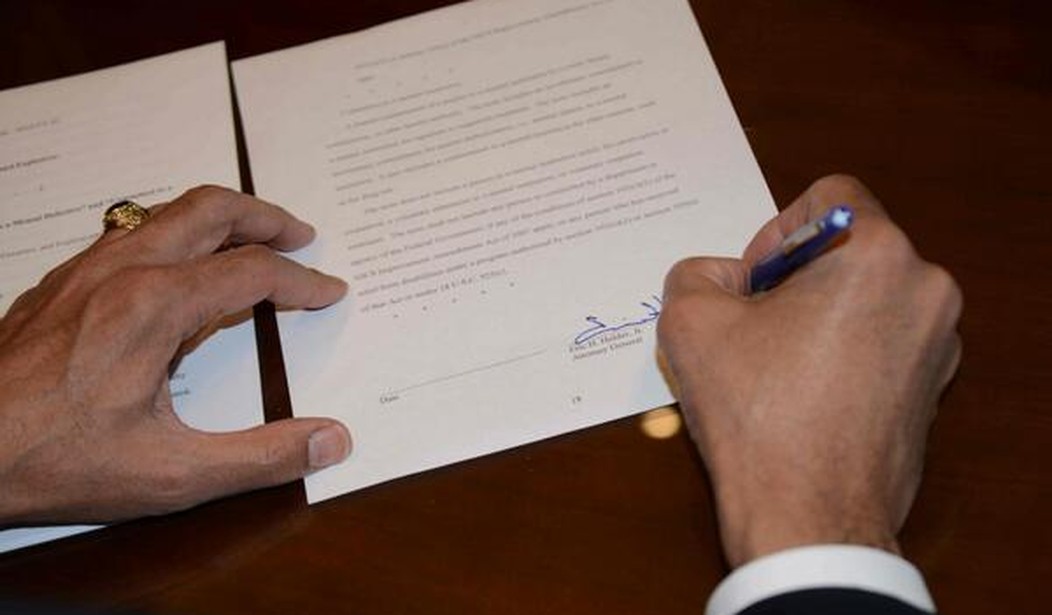WASHINGTON — As Capitol Hill was getting ready to march back to work after the holiday break, the Justice Department tweeted a photo of Attorney General Eric Holder’s hands signing new regulations to clarify who should be flagged in the federal background check system for mental health conditions.
That was coupled with a second action over at the Department of Health and Human Services, which aims to remove barriers that prevent some states from reporting mental health conditions to the background check system.
The Justice Department said Holder’s “clarification will help states determine what information may be appropriately shared with the federal background check system for firearms transfers – the National Instant Criminal Background Check System (NICS) – in order to keep guns out of the hands of individuals who may be a danger to themselves or others.”
The proposed regulation, which became available for review at the Federal Register on Friday afternoon, would revise the definition of “adjudicated as a mental defective” and “committed to a mental institution” to include “persons who are found incompetent to stand trial or not guilty by reason of mental disease or defect; persons lacking mental responsibility or deemed insane; and persons found guilty but mentally ill, regardless of whether these determinations are made by a state, local, federal or military court” as well as “a person committed to involuntary inpatient or outpatient treatment.”
“We are taking an important, commonsense step to clarify the federal firearms regulations, which will strengthen our ability to keep dangerous weapons out of the wrong hands,” Holder said. “This step will provide clear guidance on who is prohibited from possessing firearms under federal law for reasons related to mental health, enabling America’s brave law enforcement and public safety officials to better protect the American people and ensure the safety of our homes and communities.”
“And it is emblematic of the Justice Department’s broader commitment to use every tool and resource at its disposal to combat gun violence and prevent future tragedies while respecting the Constitutional rights to which all Americans are entitled,” he added.
Over at HHS, the rulemaking “would modify the HIPAA Privacy Rule to permit certain HIPAA-covered entities to disclose to the NICS the identities of persons prohibited by federal law from possessing or receiving a firearm for reasons related to mental health.”
The agency cited a 2012 Government Accountability Office report stating that 17 states had submitted fewer than 10 records of individuals prohibited for mental health reasons.
“There is a strong public safety need for this information to be accessible to the NICS, and some states are currently under-reporting or not reporting certain information to the NICS at all,” said HHS Secretary Kathleen Sebelius. “This proposed rulemaking is carefully balanced to protect and preserve individuals’ privacy interests, the patient-provider relationship, and the public’s health and safety.”
HHS had previously solicited public comment on the issue in April, in advance of proposed rulemaking. More than 2,000 comments were received before HHS moved forward with the rule.
“Seeking help for mental health problems or getting treatment does not make someone legally prohibited from having a firearm, and nothing in this proposed rule changes that. Furthermore, nothing in this proposed rule would require reporting on general mental health visits or other routine mental health care, or exempt providers solely performing these treatment services from existing privacy rules,” HHS said in a statement.
“The proposal would give states and certain covered entities added flexibility to ensure accurate but limited information is reported to the NICS, which would not include clinical, diagnostic, or other mental health information. Instead, certain covered entities would be permitted to disclose the minimum necessary identifying information about individuals who have been involuntarily committed to a mental institution or otherwise have been determined by a lawful authority to be a danger to themselves or others or to lack the mental capacity to manage their own affairs. Importantly, the proposed permission focuses on those entities performing relevant commitments, adjudications, or data repository functions. The proposed modifications would merely permit, and not require, covered entities to report to the NICS.”
This rule was also posted on the Federal Register for review late Friday afternoon.
The White House acknowledged in a fact sheet accompanying the announcements that “the vast majority of Americans who experience a mental illness are not violent,” but “in some cases when persons with a mental illness do not receive the treatment they need, the result can be tragedies such as homicide or suicide.”
“The Administration is committed to making sure that anyone who may pose a danger to themselves or others does not have access to a gun. The Administration’s two new executive actions will help ensure that better and more reliable information makes its way into the background check system. The Administration also continues to call on Congress to pass common-sense gun safety legislation and to expand funding to increase access to mental health services.”
The actions come at the beginning of the second session of the 113th Congress, where gun control faces an uncertain future after the cloture-vote failure of the Manchin-Toomey background check compromise last year.
The White House said the new actions are needed because “some states have noted that the terminology used by federal law to prohibit people from purchasing a firearm for certain mental health reasons is ambiguous” and “some states have also said that the Health Insurance Portability and Accountability Act’s (HIPAA) privacy provisions may be preventing them from making relevant information available to the background check system regarding individuals prohibited from purchasing a firearm for mental health reasons.”
“Nothing in the proposed rule would require reporting on general mental health visits or other routine mental health care, or would exempt providers solely performing these treatment services from existing privacy rules,” the fact sheet said.
AG signs reg to clarify mental health restrictions on gun possession, improves fed’l bg checks http://t.co/nmnx9oRGWa pic.twitter.com/ide6FrOJYj
— Justice Department (@TheJusticeDept) January 3, 2014









Join the conversation as a VIP Member